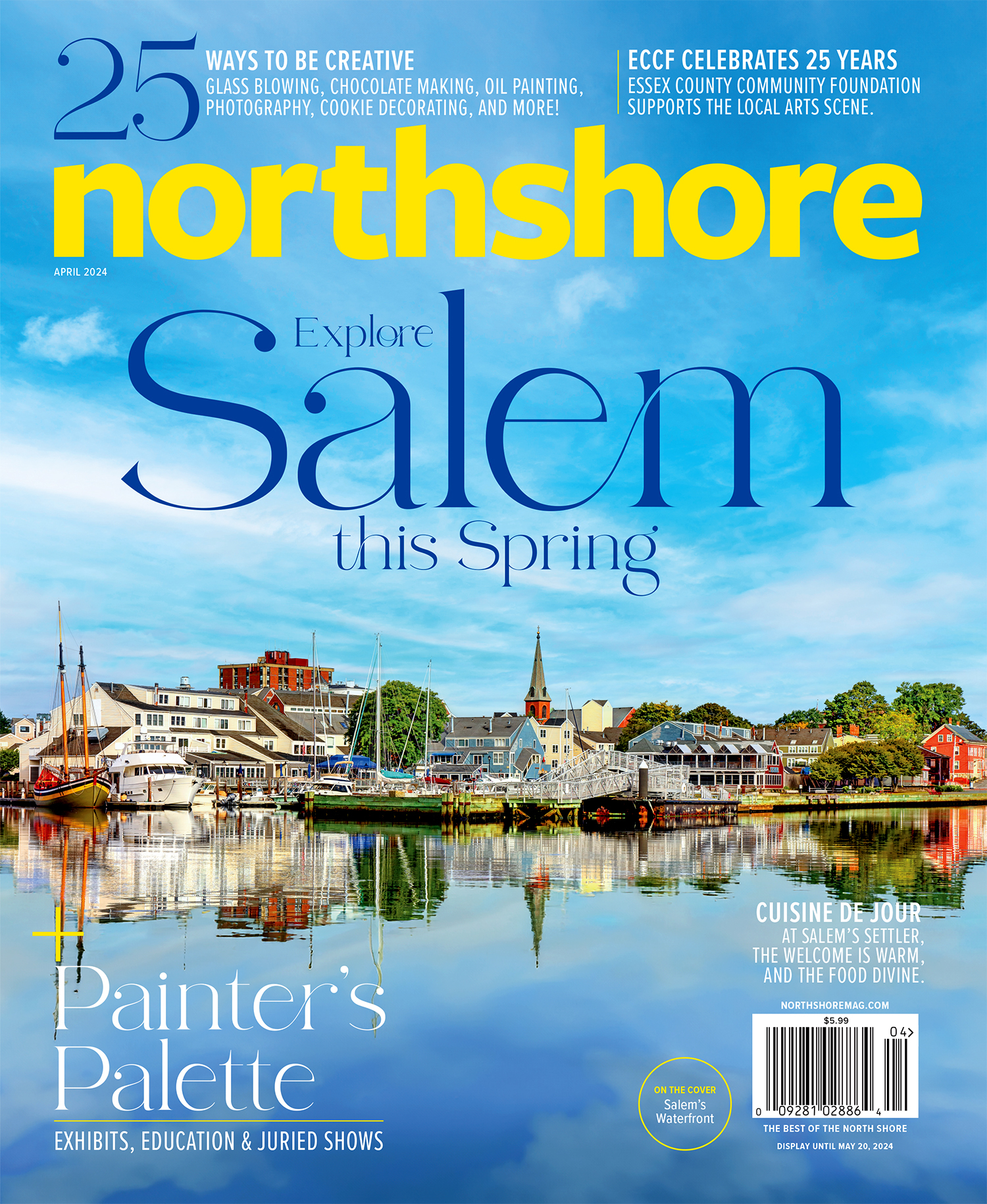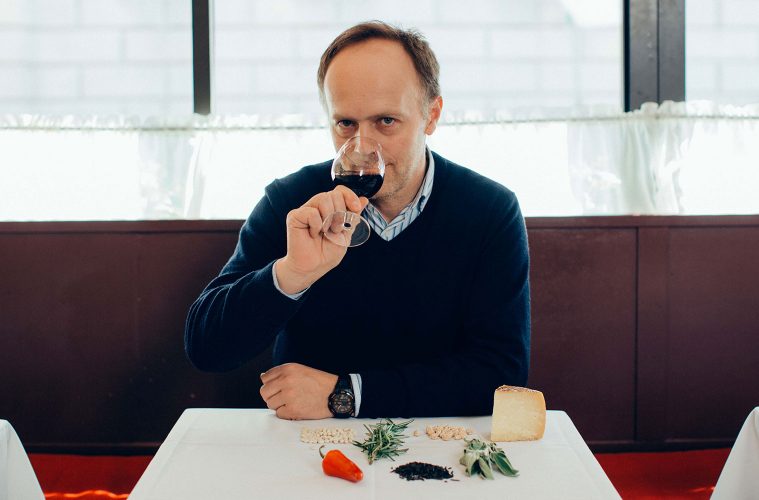The North Shore is rife with chefs who support local agriculture and economy by sourcing ingredients from nearby purveyors. Their penchant for wholesome ingredients leads them straight to the farmers, cheese makers, fishmongers, butchers, and artisanal bakers who contribute to our burgeoning cuisine scene. We spoke with a few scene makers to find out what they keep in their pantries and where they go to stock up.
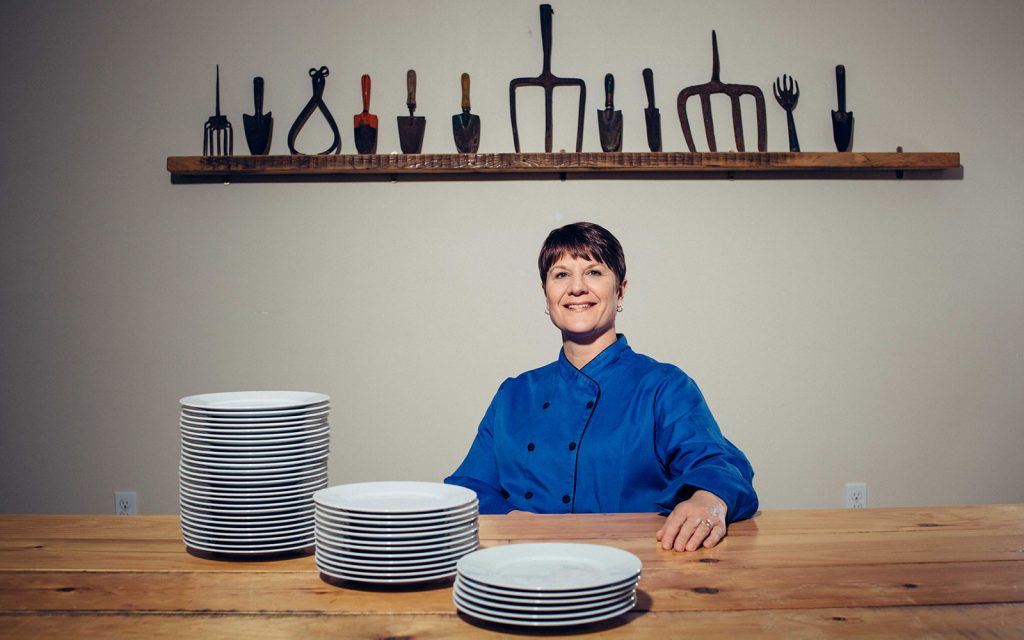
Image By Matt KalinowskI?
Chef Carolyn Grieco of Carolyn’s Farm Kitchen logs her kitchen creations and raves about the durability of cast iron pans.
Chef Carolyn Grieco of Carolyn’s Farm Kitchen in Ipswich is a serious locavore. Her ties to local farms and growers are arguably some of the strongest around. “In season, I shop at farms completely,” says the cuisinier. “I feel so connected to the growing cycles in New England, and that constant change is what really fuels and challenges my creativity in the kitchen. It’s kind of a hyper-focus—using specific crops in as many new ways as possible before moving on to the next season.”
At the top of her list of professional relationships is Appleton Farms, where she can be found throughout the year teaching cooking classes and catering signature events. Valley View Farm in Topsfield gets her business when it comes to goat-milk cheeses, while she supports Wolf Meadow Farm for softer cheeses. Marini Farm in Ipswich, Cider Hill Farm in Amesbury, and Smolak Farm in North Andover are also on her radar, as is Heron Pond Farm in southern New Hampshire. In her Haverhill neighborhood she frequents Turkey Hill Farm for berries, and Chris’ Farm Stand come the holiday season. “At Thanksgiving, we get a fresh turkey from her every year—it’s the best.” Other area vendors that receive her compliments include Tendercrop Farm—for its year-round availability of meats and winter greens—and Colby Farm.
When it comes to ingredients, she names deep green Greek olive oils and really good butter as among her favorite staples. As for tools, she says, “I’m not a fancy tool person. I am definitely a minimalist. I don’t even use a peeler; I use my paring knife.” Because she teaches cooking classes for which she provides the tools, it makes sense that she sticks to basics. “When teaching, I suggest people get comfortable with a chef knife and a paring knife.” Then again, she needs her Microplane and can’t do without a thermometer. She is also a “huge fan” of cast iron. “I know it’s bulky and heavy, but you can’t beat it—it holds the heat and goes from stove top to oven to table to grill, and you just can’t kill it.” For Grieco, it’s all about simplicity and efficiency. Thinking of other essentials, she adds: “I do always have a journal in the kitchen—I am always testing recipes and developing new things.”
Like any chef worth her salt, Grieco has quite a volume of cookbooks and magazines that she will revisit for inspiration. She particularly enjoys “retro cookbooks” such as old issues of Farm Journal as well as books on canning and preserving. Looking at throwback recipes, thinking about how people cooked years ago, and applying some of those ideas for today’s tables is something she finds pleasurable. “I am able to take old ideas and develop modern recipes from them.” She also has a lot of “CSA cookbooks” from around the country, and appreciates “specific cookbooks” that deal with a single item like apples or greens, as well as those that cover topics like woodstove cooking. “I love books that are quirky and nontraditional,” she adds.
Family holidays hold especially fond memories for the artisan chef. She and her husband both have large families—they can easily find themselves seated at a table set for 30 people. “We all love to cook and we all participate in the meal,” says Grieco. “We always tease my mom because she will put a big cheat sheet on the wall with everybody’s name and a dish next to it—that’s how she organizes [everything]. It’s about family and having everybody contribute something. I am lucky to have a family that enjoys food as much as I do.”
Grieco’s thoughts on the North Shore culinary scene are very positive: “It’s exciting. Everybody has something different to offer—that’s what I love. On the farms…people specialize in berries or cheeses or meats—there’s just so much out there. There are a lot of new restaurants, new chefs doing different things, classes, farmers’ markets—there’s just a lot of activity.” She notes, too, that the farmers’ markets are growing, both in number and in terms of what they offer. It appears there is no end to the bounty from which she draws.
Carolyn’s Farm Kitchen
Ipswich
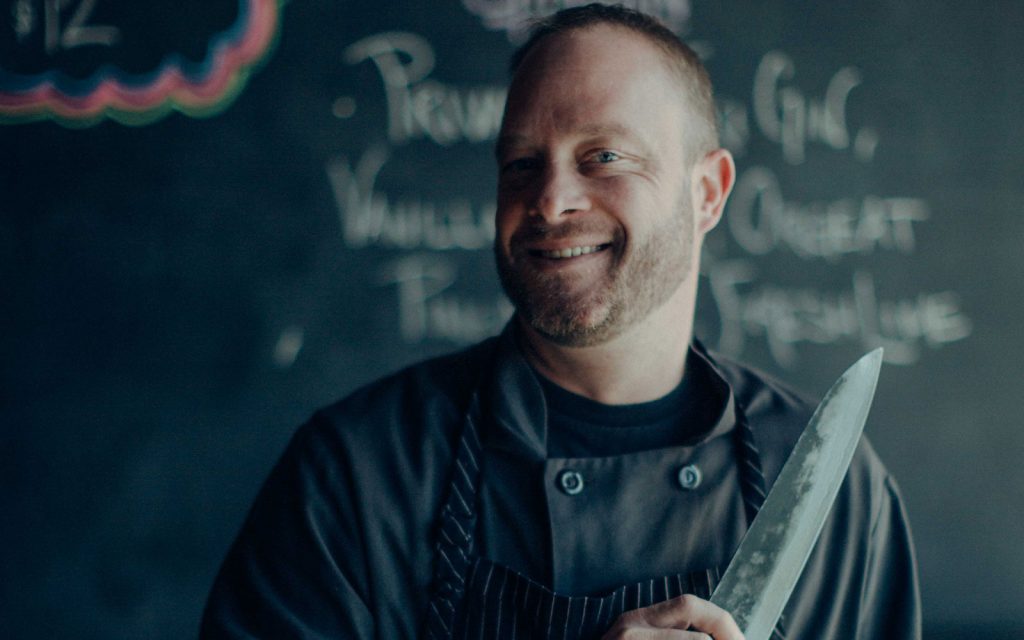
IMAGE BY MATT KALINOWSKI
Tighe has a penchant for local honey and his Japanese chef knife.
Chef Chris Tighe of Salt Kitchen and Rum Bar in Ipswich appreciates the subtlety of honey. “It’s a nice balance of things. It’s sweet, but it’s not unhealthy like sugar…. When I can, I like to use honey from New Harmony Farm in Newbury.” He also sources produce year-round from that same farm, which is less than 10 miles away. He credits them with growing fresh arugula in the dead of winter. Marini Farm is another of his sources—he says their corn is exceptional. The restaurant is also starting to develop a relationship with Three Sisters Garden in Ipswich, and Tighe is excited to see what will make it from their farm to his table.
Always at the ready? A 10-inch Japanese chef’s knife.
For cookbooks, he references The Art of Living According to Joe Beef, written by Joe Beef Restaurant co-owners and chefs Frédéric Morin and David McMillan, along with writer and former Joe Beef staff member Meredith Erickson. (Located in a working-class neighborhood of Montreal, Joe Beef is at the epicenter of the city’s reputation as a foodie destination.) “I like their philosophy and their playfulness,” says Tighe. “They do what we are trying to do here, which is to make really nice stuff without taking it too seriously…and to find nice [ingredients] that aren’t too pretentious.” He also still enjoys On Cooking, which was one of his textbooks in culinary school. “I always seem to go back to it for something. It’s a really good reference.”
Asked about a favorite memory in the kitchen, he recalls his experience abroad. “It would have to be when I was in Italy…working in a restaurant…it was a tiny environment, and I was working with all these people from [all over the world]. But with food, you can cross any sort of boundary. No matter what language you speak, you get a sense of home when you’re among people [cooking].”
When considering the North Shore’s overall cuisine scene, Tighe says: “It’s evolving. I think it’s getting better restaurants than even six years ago. I think there is better food now, in general. With all the farms that are coming up, we are able to get higher quality ingredients than we were available to years ago, especially [by] working with farmers.”
Salt Kitchen and Rum Bar
1 Market Street, Ipswich
978-356-0002
-1024x640.jpg)
IMAGE BY MATT KALINOWSKI
Phat Cats Bistro owner and chef Paul Eastman uses a variety of different salts in his dishes. ?
Amesbury’s Phat Cats Bistro chef-owner Paul Eastman looks to Cider Hill, Heron Pond, and Middle Earth Farms for many of his ingredients. In fact, he sources produce locally year-round. “We get potatoes from Heron Pond—they have a nice root cellar, and we get greens from them all year.” His meat comes from Shaheen Brothers in Amesbury, while seafood is brought in from David’s Fish Market & Lobster Pound in Newburyport. Wolf Meadow Farm cheeses and fresh pasta and ravioli from Valicenti Organico in Hollis, New Hampshire, also appear on Eastman’s seafood-heavy menu. In fact, his mantra for the bistro is: fresh and local. “Everything is either homemade or from a vendor who makes it better than we do, like the pasta, though we do make our own gnocchi. And my partner is a pastry chef so she does all the desserts in-house, and we make our own ice cream.”
Essential ingredient? Salt. “You need it for everything. Food wouldn’t be good without salt.”
And as meat loves salt, Eastman loves his grill. “It’s primal—you know, men and their grills.”
The French Laundry Cookbook by Thomas Keller ranks high on his list of references. “I like books about artisanal cooking, [that cover] things like curing or smoking beef, and also history-of-food type books.”
Thinking back on his days in the kitchen, Eastman points to his family roots as influencing his career choice: “One of my grandfathers was a chef. He would go out and catch his own fish, then come home and smoke it. My other grandfather was a baker—he was always making homemade baked goods at our house growing up.”
The bistro chef agrees that the North Shore culinary scene is up and coming. “It’s definitely developing. It’s nice that there’s more of a variety of restaurants to go to that have expanding menus—it’s not all cookie-cutter. There are a lot of talented chefs out there; it’s nice that people are letting them use their talents [by trying] their cuisine.”
Phat Cats Bistro
65A Market Street, Amesbury
978-388-2777
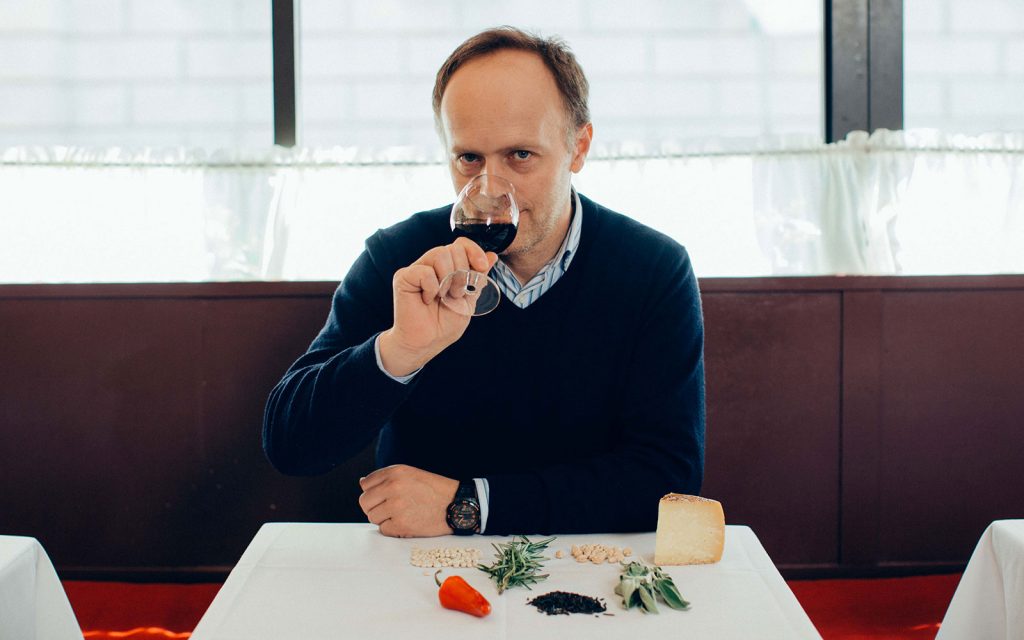
IMAGE BY MATT KALINOWSKI
?Firenze Trattoria owner and chef Zamir Kociaj uses many Mediterranean- derived herbs.
In Salem, Firenze Trattoria chef-owner Zamir Kociaj describes Mediterranean herbs like rosemary, sage, oregano, and thyme, which he grows during warm months, as integral to his Spanish and Italian dishes. For other ingredients, he hits farmers’ markets. “When the season permits, I shop at the farmers’ market in Salem every Thursday, and in Swampscott and Marblehead. I also shop at Clark Farms in Danvers and Smolak Farms in North Andover.” For pasta, it’s Lilly’s Fresh Pasta Company in Everett that receives his orders.
In the kitchen, he notes: “I do rustic Northern Italian cuisine using recipes from the past so my tools are not fancy, they are basic—a chef knife and pots and pans. If you have a chef knife and a pan, you basically can cook anything.”
Kociaj has read many cookbooks focused on regional Italian and Spanish cuisine, but he truly values books that are more than compilations of recipes; he enjoys those that include stories about chefs. “So we can get to know them—their culture and background and their philosophy behind the food…they put something from their heart into the book.” He raves about the newly published book, Every Menu Is a Love Story: Ecco Perché Amore by Marisa Iocco, who, says Kociaj, “is, in my opinion, the best chef in Boston.”
For Kociaj, “Cooking is a beautiful process full of small daily memories. It is a challenge and a life performance.” He speaks caringly about the many emotions people have around food, and he likes the idea that his dishes are part of other people’s memories. “When what you do with your heart and your hands makes people happy, that’s a very good and important feeling,” he says. “When people dine at my place, they often talk about past experiences in Italy. I like that. What I do here can, even for a few moments, remind them of a beautiful moment in their life.”
Firenze Trattoria opened nearly three years ago. During that time Kociaj has watched the North Shore culinary scene boom. He attributes that to restaurant goers’ increasingly sophisticated palates. “I believe good restaurants are not made by chefs but by clients—if there is demand for good food and hospitality, there will be chefs and restaurant owners who will provide it.” Kociaj appreciates the area’s various ethnic cuisines as well as the creativity now evident on “American food” menus—he views the diversity of offerings as good for business. “That’s important for a chef…competition is the best thing…it puts you in a position to think, to invent, to better yourself everyday, and to shop for the best ingredients.”
The chef notes that Salem’s taste for fine foods, in particular, has grown tremendously in the last few years. “Salem is becoming a foodie town,” he says, tying food to the city’s many cultural offerings. He says food itself is a cultural offering. In fact, he views restaurants as integral to the community. “Going to restaurants is like going to a show or going to a book reading or some other artistic or cultural event, because food is culture. Through food we evoke emotions. That’s a very important part of our lives.”
Firenze Trattoria
2 Lynde Street, Salem
978-219-1188
